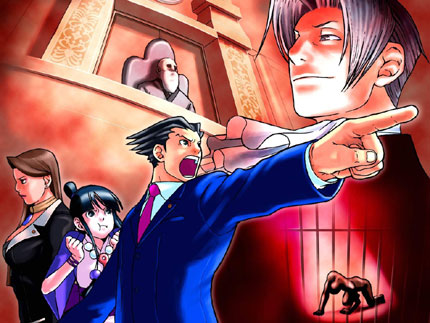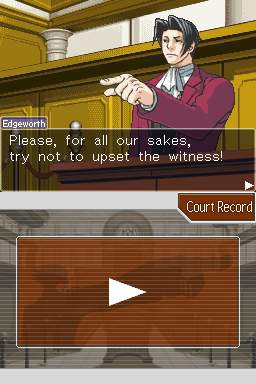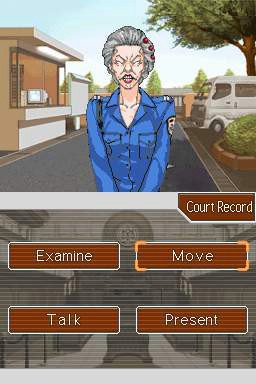AHHHHH! AFTER TEN THOUSAND YEARS I’M FREE!! TIME TO CONQUER EARTH REVIEW VIDEO GAMES

Phoenix Wright: Ace Attorney& Phoenix Wright: Justice for All
Capcom, NDS
In a nutshell: Zany murder trials make for surprisingly compelling gaming, considering it’s basically all text.
You’d think that all the years of Nintendo games under my belt would have taught me a thing or two about judging a game by its hero. I mean, look at Mario. He’s the hardest working fictional Italian in gaming, though he’s still classically known as just a plumber. So I guess it shouldn’t be that surprising that a game about a defense attorney of all things would be so damn engrossing.
 Phoenix is a good example of “It’s not what you say, it’s how you say it.” If it was presented straight, it’d be boring as hell. Luckily that’s not the case, as the courtroom precedings and investigations play out like some kind of epic clash of dramtic poses and cutting glares, the likes of which usually precede anime characters beating the shit out of each other. The fact this game shares an artist with the Rival Schools series gives it an immense amount of character as well and adds to the excitement with large, detailed portraits of the characters, usually with lots of spare animations in addition to the obvious lip flappage. The animations are re-used a lot, but they’re well done enough it doesn’t matter much. My favorites are the special ‘finishing’ animations of some witnesses when you’ve ‘vanquished’ their false testimonies. (One man strangles himself until he faints with his scarf, while the classic ‘ominous organ piece’ plays in the background.)
Phoenix is a good example of “It’s not what you say, it’s how you say it.” If it was presented straight, it’d be boring as hell. Luckily that’s not the case, as the courtroom precedings and investigations play out like some kind of epic clash of dramtic poses and cutting glares, the likes of which usually precede anime characters beating the shit out of each other. The fact this game shares an artist with the Rival Schools series gives it an immense amount of character as well and adds to the excitement with large, detailed portraits of the characters, usually with lots of spare animations in addition to the obvious lip flappage. The animations are re-used a lot, but they’re well done enough it doesn’t matter much. My favorites are the special ‘finishing’ animations of some witnesses when you’ve ‘vanquished’ their false testimonies. (One man strangles himself until he faints with his scarf, while the classic ‘ominous organ piece’ plays in the background.)
Of course, while dialogue is the bulk of the game, it’s not all there is. Courtroom scenes, which are arguably the ‘meat’ of the game are won by pressing witnesses’ statements for lies then presenting evidence from your folder at the appropriate juncture. Occasionally they will also ask you for simple multiple choice answers, of which the correct answer is usually the gutsiest one. (“Who is the killer?” 1. The defendant 2. the plaintiff or 3. YOU, YOUR HONOR!!1) In between these, you wander about the crime scene and other areas searching for clues to help you out. These both have you talking to people (and inevitably, mini ‘fetch quests’) and using a free search tool to find suspicious things in the background.
 I don’t normally care about spoiling games, since I personally tend to get more interested in a storyline if I know a little of it going in. But given the fact the Phoenix Wright series are basically crime novels in DS card form, I’ll cheerfully refrain since it’s worth unraveling for yourself. Spoiling Aeris’s death is one thing; blowing the case endings in one of these games actually DOES detract from the gameplay.
I don’t normally care about spoiling games, since I personally tend to get more interested in a storyline if I know a little of it going in. But given the fact the Phoenix Wright series are basically crime novels in DS card form, I’ll cheerfully refrain since it’s worth unraveling for yourself. Spoiling Aeris’s death is one thing; blowing the case endings in one of these games actually DOES detract from the gameplay.
Each chapter includes the word “Turnabout” in the title, alluding to the game’s original Japanese title Gyakuten Saiban, roughly Turnabout Courtroom. Unsurprisingly, the game underwent some pretty heavy localization, but at least it’s more consistent than that of Super Robot War: Original Generation’s. The whole setting was uprooted from Japan to (apparently) Southern California, which makes for some odd disconnects like the reliance on the train system and of course, the second game having a traditional Japanese village in the middle of nowhere. Most of the characters had weird pun names as well, which were either adapted or made into names that are just plain silly (Dick Gumshoe, for one. Ini and Mimi Miney for another two.)
Capcom also makes a point of covering their asses as far as possible real-world legal inconsistencies by setting the game in 2016 with a back story that a new speedy trial system was put into place, with new rules so that all first trials are resolved in a maximum of three days. Defendants never seem to need to be or are asked to testify themselves, there doesn’t seem to be any concept of accidental death or manslaughter, etc. (Literally, “An accidental murder is still a murder!” in one scene.)
The real joy of the game comes from both the quirky characterizations and the elaborate, Sherlock Holmesian cases. It’s a legal circus that puts even the best celebrity trials to shame. Clowns and parrots take the witness stand, prosecutors make their will known with tasers and whips, and of course, the opposing attorneys clash with bold cries of OBJECTION! and TAKE THAT! And though the games are mostly episodic, they also each have their own larger story looming in the background, the first’s “DL-6 Incident” in particular coming to a really great conclusion.
In fact, really the only sad drawback to the Phoenix Wright games is a lack of replay value. There’s not a dozen special endings to shoot for, or hidden lawyers to unlock (though, actually come to think of it, I’d like that option.) Once you’ve solved the case, there’s no real reason to replay it, other than just re-reading your favorite chapters or seeing how fast you can blast through knowing all the answers. It’s pretty fun to show people everything in your evidence folder regardless of relevance just to see what they do.
As for differences between the first and second game, there really aren’t many. The ‘life meter’ changes from a series of exclamation points to a more flexible, fighting game-like life bar that loses variable amounts depending on how serious the line of questioning. In addition, the second game introduces Psyche-Locks to decipher in the examination phases, and character dossiers count as evidence to present. The second game is a bit tougher as a result, since Psyche Lock tests can harm your health (though solving them gives back 50% of your life and you can’t actually “die” from failing them) and the addition of profiles drops your odds of submitting just the RIGHT piece of evidence to prove a point. That’s about the hardest part of the game, incidentally- not just figuring out the clues, but figuring out exactly what page of dialogue to present the evidence on and choosing the right piece to make sure it’s ‘phrased’ the way the game wants. Too bad the mic function doesn’t let you just yell “THE KILLER WAS HIDING IN THE ______”.
So yeah. Phoenix Wright gets no objection from me. The first game’s in short supply, so you might have to resort to eBay like I did to find it, but Justice For All seems to be pretty easy to come by in comparison. If you can find it and not the other, you shouldn’t be too lost since the first chapter uses amnesia as a convenient tutorial device, though you might not ‘get’ some of the returning cast in spite of the explanations they toss in as refreshers. Incidentally, I played the second first myself and that didn’t ruin my enjoyment at all. Both games are technically four cases in length, though the first also includes the DS-specific ‘bonus’ chapter “From the Ashes,” which ends up making Ace Attorney much longer than its successor. All in all, both are solid and worthy additions to your NDS library, and we can only hope and wait with bated breath that the third installment is on its way.

I almost got that the other day but decided on Lunar Knights instead.
Nice review. It covers just about everything. Although, I’d like to add that I think the major reason the game is so fun is because it’s basically about winning arguments, when absolutely everbody is against you, no less. No other game… hell, no other MEDIUM has successfully been able to instill that kind of feeling of success in a person. In other games, you can beat up people who are wrong, but you’ve never actually been able to PROVE they’re wrong until now.
Also, I’d like to comment on the statement “the Phoenix Wright series are basically crime novels in DS card form”. The statement is accurate, but it just feels wrong to make, having seen what Hotel Dusk offers. THAT’S a crime novel in DS form.
(Short-term elaboration: In Phoenix Wright, at least there’s a game in the sense that they make you figure out what’s going on. In Hotel Dusk they just tell you.)
I love phoenix wright, one of the best DS games around.
As a huge fan of Phoenix Wright, I couldn’t have put it any better myself.